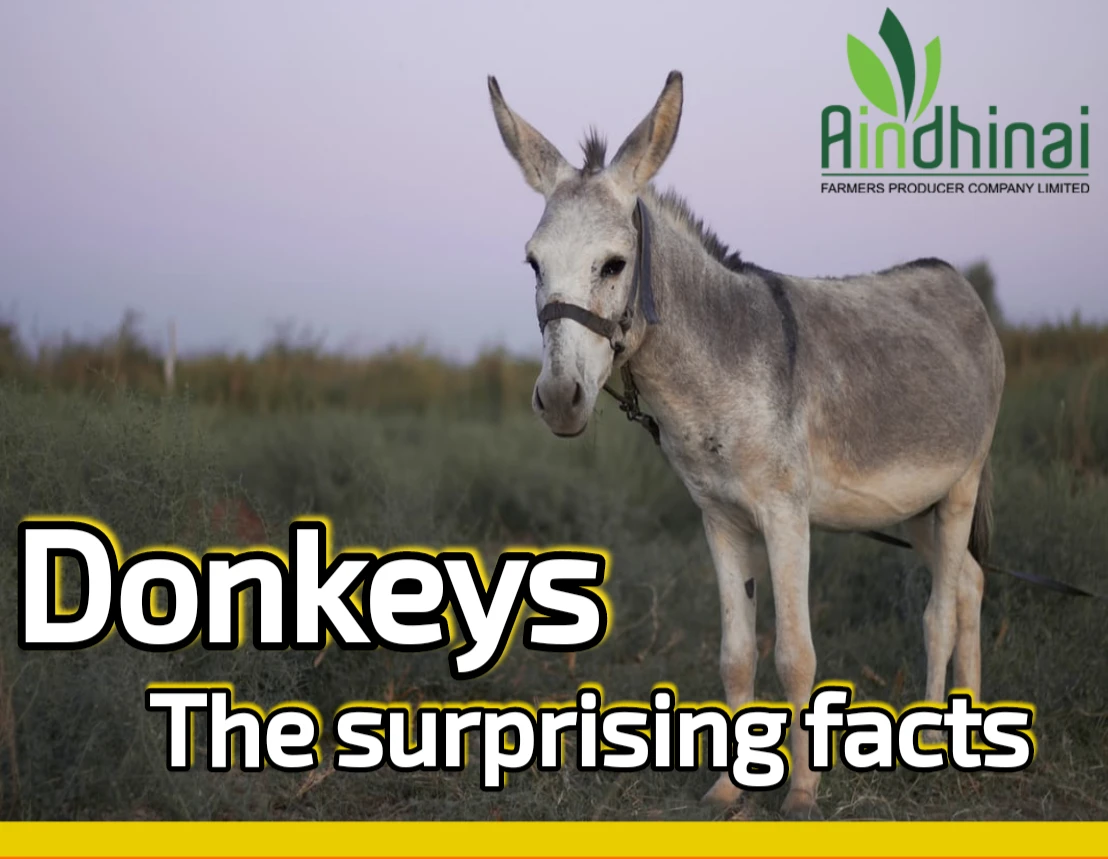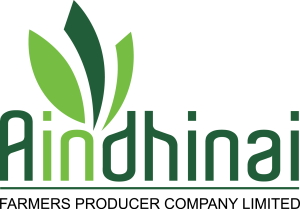AINDHINAI FARMERS PRODUCER COMPANY LTD
Donkeys- The surprising facts

🐴Donkey Rearing:
👉The donkeys would grow to the maximum height of 91 cm to 140cms in general.
👉A donkey would yield approximately from 200 to 300 ml of milk per day.
👉The average weight of a donkey would be 100 to 130 kilograms and it would be able to carry a burden equivalent to half of its
total body weight.
🐴The demand for Donkyes:
Donkeys are in demand for two main purposes.
- The donkey has a high demand for its meat and for its milk that has medicinal properties and the skin for the production of cosmetics .
- Donkeys are still used as carriers of burden for transport in hilly and rocky terrains.
🐴Scientific ways of rearing donkeys:
Traditional way of rearing donkeys is taking them for grazing of green pastures and quenching their thirst with water every day.
Apart from this green fodder could be stall fed to the donkeys in the stables themselves. Donkeys also could be fed on haystacks.
🐴Minerals and salts:
Just as cattle and goats are fed with food supplements such as minerals donkeys too should be fed with 30 to 40 grams of mineral salts diluted in water. Thus the health of donkeys can be maintained with the right balance of vital nutrients.
🐴Proper shelters Donkeys:
Shelters or sheds are very important requirement for donkeys to protect them from vagaries of harsh hot and cold weather conditions and preventing them from contracting diseases.
🐴Disease prevention:
Donkeys are susceptible to develop fits induced by bacterial infections from the wounds and injuries. Hence to prevent the same the animals should be vaccinated against tetanus.
Similarly donkeys would be highly exposed to the risk of dog bites and resulting in infections. This can be prevented from anti rabies vaccine.
De-worming too is important in rearing donkeys as tape work, hook worm etc would make the animals lose weight and become
weak and extremely exhausted.
🐴Donkey dung:
The dung of donkey is used as an excellent manure for plants. And the donkey dung is also roasted and tied around the head in a cloth as a remedy for fluid retention .
🐴Benefits of donkey urine:
The urine of donkey is considered to be having therapeutic benefits to recover from addiction of alcohol. The practice of drinking donkey urine for the purpose is reported in some European countries.
🐴Rearing methods:
The Male and female ratio must be 1 male (jack) per 10 female donkeys (jennies).
Keeping the males with the females always together would harm the females as the males would be always exhibiting aggressive sexual behavior. Hence 1 male donkey(Jack) per 10
female donkeys (jennies).Donkeys normally would graze for about 12 hours in a day and
would be able to carry a burden of 40 kilograms. The practice of Rearing the donkeys for milk has been on the rise.
🐴Increasing importance of Donkeys:
According to the article published by the FAO(Food and Agriculture Organization) on donkeys the milk of donkeys could be given as remedy for those having allergy for cow’s milk as it contain abundant nutrients just as human mother’s milk. The fat and protein contents of the donkey milk is also very balanced. Legend has it that the famous Egyptian empress Cleopatra used to bathe in the water mixed with the milk of donkey.
🐴China’s tryst with donkey:
In China alone around 5 million donkeys are killed for its meat and skin as these command attractive price in the market. Cosmetics and traditional medicine also are produced with the help of the meat and skin and the wastes of donkeys in China.
🐴Donkeys in India:
Though has a long tradition of rearing donkeys for various purposes, awareness on its value in the current scenario is very limited. And professional donkey rearing is also very minimal in India.But the level of awareness is high in the European countries and hence the sale of donkey milk and its byproducts such as
cosmetics are in high demand as well.
🐴Tamil Nadu:
Tamil Nadu state has only around 1400 donkeys at present.
🐴Kerala:
The soap and creams made of the milk of donkey are sold in a big way and the demand for the same is high. The companies making the donkey based products from Kerala are willing to purchase any quantity of donkey milk from AINDHINAI.
📞For further details:
Aindhinai Farmers Producers Company Ltd.
Trichirapalli.
+91 98424 81968
(Whatsapp) +91 86103 68481
